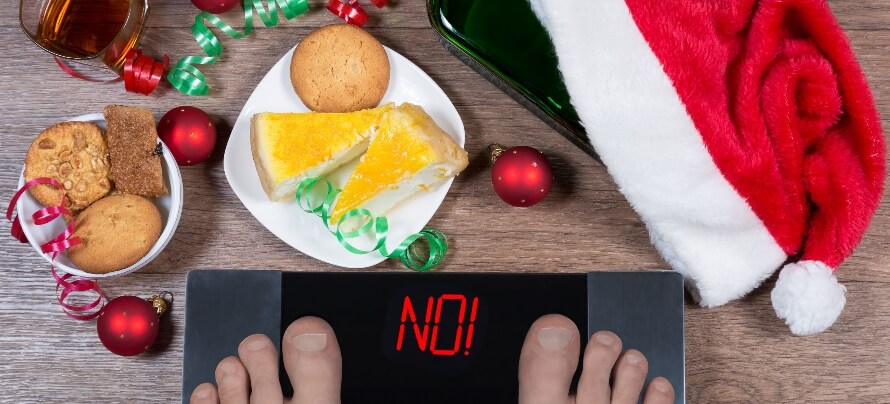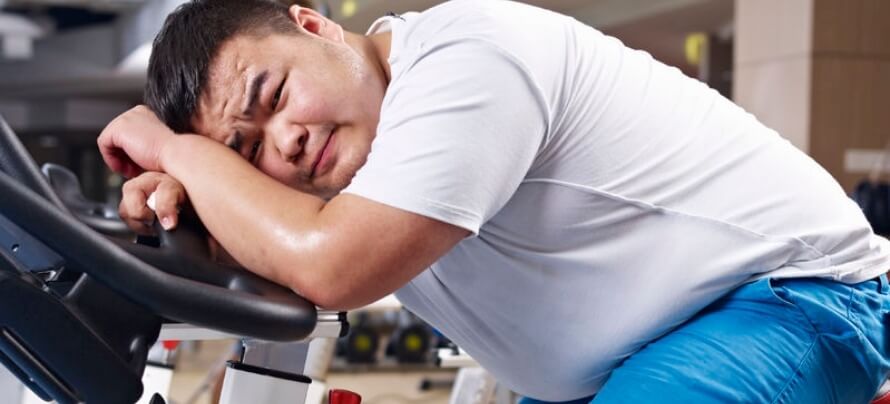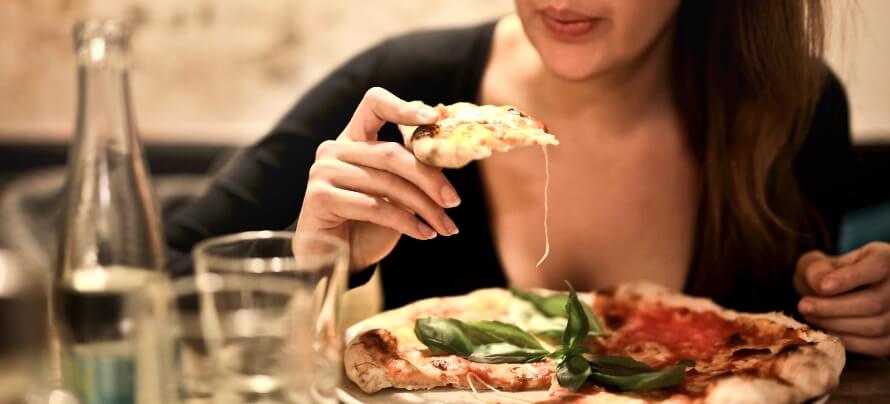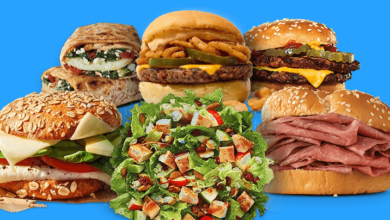8 Tips To Avoid Gaining Weight On Vacation That Actually Work

The central theses
- Most people only gain 1 to 2 pounds of fat on vacation. This can easily be avoided or lost if you know what you're doing in the kitchen and gym.
- One of the best ways to avoid excessive fat gain on vacation is to have one large meal each day and stick to low-fat, high-protein, high-fiber snacks for the rest of the time.
- Read on to learn seven more effective ways to avoid fat gain on vacation (including managing your alcohol consumption).
Every holiday season, you'll see the same items making the rounds:
"How Do I Avoid Gaining Weight On Vacation?"
"How To Keep The Pounds Off This Thanksgiving Day"
"20 Tips To Avoid Gaining Weight On Vacation"
Each article follows the same stock format, sharing stats on how many pounds of weight you put on between Thanksgiving and New Years, then gives you a long list of trite weight loss tips like "cut out the added sugar" or "chew your food slowly , "Or" drink water before meals. "
And if you're anything like me, after reading the first paragraph you will look like this:
It's not that the stats are wrong or the tips are useless, but at this point you probably know that eating more calories than you burn is the main cause of weight gain and the only way not to gain weight is to not so much to eat.
Of course, during the holidays this is easier said than done.
You are surrounded by a cornucopia of delicious, high calorie foods and disconnected from your normal routine, making it remarkably easy to overeat.
So what should you do about it?
What's the "hack" to avoid gaining weight on vacation?
It is this: Accept that you are likely to gain a little weight, use some simple strategies to limit the damage while you are still enjoying your meals, and lose the weight on a proper diet after the holidays.
That's it.
Before we get into these strategies, however, let's dig deeper into the whole idea of gaining weight while on vacation.
How easy is it to gain weight over the holidays?

The short answer?
Not as easy as you might think.
The idea that people put on a lot of body fat on vacation has become a given – it's just accepted as a fact that you are likely to gain three, five, or more pounds.
In addition, many people have been led to believe that weight gain on vacation is the main driver of weight gain in general. That said, they think that every holiday season they put on a little bit of weight that they never lose, and this adds up over years and decades. This exposes them to extreme pressure Not gain weight over the holidays.
It turns out that the first point is mostly wrong, but the second point is mostly right.
Research shows that in the six weeks between late November and early January (including Thanksgiving, Christmas, and New Years), most people actually gain only one to two pounds of body weight.
Read: How Much Fat Can You Gain in a Single Day by Bingeing? What 20 studies say
For example a study Conducted by scientists from the National Institute for Child Health and Human Development, 195 healthy men and women weighed at regular intervals from late September to the following March.
They found that people gained about 1 pound on average between mid-November and mid-January. A year into the start of the study, the researchers weighed 165 of the participants again and found they averaged 1.4 pounds heavier than last September.
Further studies by scientists of the University of Oklahoma and Texas Tech University found the same thing: most people gain around 1 to 1.5 pounds on vacation.
That's not even enough to notice a difference in your looks.
Unfortunately, looking at average weight gain in these studies hides an important fact: People who are already overweight or obese tend to put on much more weight than people who are healthy weights.
For example the same study In the 195 adults I mentioned earlier, 14% of participants found that they gained 5 or more pounds (about a pound a week) in the ~ 6 weeks from Thanksgiving to January, and that the weight gain during the holiday season was about Half of that accounted for her annual weight gain. These people were also the most overweight at the start of the study. (The Matthew Effect strikes again!)
As you've no doubt heard before, most people never lose the weight they put on during the holidays. Although they only gain a pound or two, these small increases build up over time and grow to 20, 30, or more pounds over a few decades.
That sounds bad, but it isn't surprising or inevitable either.
The studies mentioned so far involved regular Americans whose diet are usually poor any day of the year, holiday, or no. Most people overeat for most of the year – the intensity only increases during the holidays – so you expect to gain more weight during this time. The reason they never lose weight is because they still easily overeat for the rest of the year.
Here's the good news:
By the time you're reading this article, you probably know a little more about proper diet and exercise than your average bear. And if the average person (who doesn't think much about their diet or exercise habits) gains just 1 to 2 pounds, someone like you can eliminate, limit, or quickly reverse any fat gain over the holidays if you are proactive.
Read on to learn how.
Summary: Most people only gain 1 to 2 pounds during the vacation, and you can reduce or quickly reverse that weight gain by using the right diet strategies.
8 easy ways to beat weight gain on vacation
You've probably heard all of these tips before:
- Limit your food choices
- Eat simpler, less appetizing foods
- Better pay attention to your portion sizes
- Wait 20 minutes before helping yourself seconds
- And so on. . .
While these recommendations can help you avoid overeating in situations where you are offered a lot of delicious food. like travelingYou have likely found that they have limited use during the vacation. "No plan survives contact with the enemy" and all of that.
Part of the fun on vacation is "letting go of the guard" and enjoying yourself. This doesn't mean uninhibited gluttony, but it also doesn't mean irrational self-denial.
Rather than giving you a laundry list of mundane tips that you will likely give up when faced with a glistening turkey, warm biscuit, or chilled glass of eggnog, here are some counter-intuitive, but very effective, methods for limiting and reversing vacation weight gain enjoy.
1. Expect weight gain (and lose it quickly).

Having the right attitude and expectations about your vacation is one of the best ways to avoid falling off the cart and blowing yourself up, as fitness folks call it.
You should accept that you will gain some weight even if you gain very little or no body fat.
This is because a lot of the weight you gain is due to it water and Glycogen Storage and simply more food in the stomach. So don't be surprised if you step on the scales the morning after Thanksgiving or Christmas and see a much larger number than the day before.
Fortunately, this weight also disappears within a week after you return to your normal diet.
Well it is likely that something Of that extra weight will be real body fat, but again, you can lose it quickly through proper diet and exercise.
Read: 5 Inconvenient Fitness Truths Everyone Needs To Hear
The trap of many people fall into tells themselves that after one of these considerations they "blown it" and then throw caution to the wind. They already have it in their minds destroyed their dietSo you might as well go all in and deal with the aftermath later.
Ironic, research shows that people who try to adhere to very strict dietary rules under all circumstances are the most likely to break their diet. It is the people who tell themselves that they "don't eat extra sugar" or "don't eat any more calories after 7pm". or "eats 1,500 calories a day except Thanksgiving and Christmas" which tend to succumb Binge eating the most.
We want to avoid this, and one effective way is to treat the holidays as a "diet break" rather than a series of "cheat days"Enforces with your regular" healthy "diet.
Read: Research Report: Can "Cheating" In Your Diet Help You Lose Fat Faster?
That said, get a little more junk food and slightly larger servings than you normally would, but stick to the capstone too Habits healthy eating (which you will learn more about in a moment).
So primarily think of the holidays as a time to step on the gas and relax about your diet. Don't overreact if you gain a little (or even a lot) of weight. Most or all of it will quickly go away after you start eating normally again, and any remaining fat gain can be quickly lost over the next few weeks.
Summary: Eat a little more and a little more “unhealthy” than you would normally do on vacation. Gain several pounds of body weight. and remember that this is not all fat and will quickly go away after returning to your normal diet.
2. Focus on things other than food.
Eating is a central part of the vacation, and sharing meals with friends and family is something you can enjoy.
That said, if you come first in the celebration, you will be eating a lot more than you should.
Therefore, it is best to think of the food as a side effect of the overall vacation experience, rather than a main attraction.
On the one hand, you shouldn't limit your food intake for days in advance and think about how you will "use up" your calories during the vacation. On the flip side, don't force yourself to eat like a runway model while everyone else is enjoying generous portions.
Read: Why "eating clean" isn't the key to losing weight or gaining muscle
Both approaches involve an unhealthy fixation on food – mental energy that could be better directed towards other non-food activities such as picking and wrapping gifts, picking up and decorating a Christmas tree, visiting farmers' markets, the Visiting friends and family, playing board games, splitting firewood and so on.
Summary: Don't consider food the main attraction of the holidays. Instead, think of it as a side effect of the overall experience.
3. Create a calorie buffer before large meals.
There are two general schools of thought among fitness enthusiasts about how to eat on holidays, usually Thanksgiving, Christmas, and New Years in the United States:
- You should eat filling, healthy, low-calorie snacks for the rest of the day, especially just before your large meals, so that you are not so tempted to overeat.
- Eat as little as possible for the rest of the day to create a large calorie buffer so that even if you overeat, your total caloric intake for the day is not outrageous.
Which method you ultimately choose depends on your personal preferences and previous experience. I've found that people who are not very experienced with structured diets can make the best use of option 1. They are used to it, "intuitive eating, ”And would prefer to only stick to what they know will work during the holidays.
People who are more experienced in planning and controlling meals Body composition tend to prefer the second option. They have a good sense of how much they ate. how much You need to eat per day to lose weight and how to effectively lose weight after gaining weight.
While this seems to contradict my previous recommendation not to think about all of the foods you will be eating, it doesn't. It takes very little mental and physical effort to eat less on the days of your big meals, but this can limit fat gain significantly. In other words, it is a low-effort, high-reward strategy.
Additionally, no matter how many healthy, filling, high-fiber snacks you have previously eaten, you will likely overeat on holidays. So you can also eat less early in the day and enjoy your big meal. In other words, you probably won't turn down dessert because you had some carrot sticks and hummus a few hours earlier. . .
After all, you will likely feel full after you eat, and you won't want to eat anything else for the rest of the day anyway (assuming you eat in the afternoon or early evening). So if you don't eat a lot before your big meal and eat little to nothing afterwards, you can keep your total caloric intake under control without any control to be hungry for more than a couple of hours (if so).
If you want to create a calorie buffer using Option 2, the following rule of thumb applies:
Eat around 50% of your daily protein goal all day before the big meal. That said, if you typically eat 200 grams of protein a day, try to eat at least 100 grams of protein before you start inhaling treats.
My favorites are non-fat Greek yogurt, low-fat cottage cheese, egg whites, Whey protein powder, Casein protein powder, Boneless and skinless chicken breasts, canned tuna and low-fat lunchtime meat.
If, despite eating so much protein, you are still hungry, eat fibrous fruits and vegetables like apples, oranges, strawberries, and melons to help you recover.
Summary: If you want to eat a lot of calories during a feast, you can limit fat gain by eating mostly protein and fibrous fruits and vegetables all day before and after the big meal.
4. Eat large meals, limit snacking.

One thing that has struck me is that the people who find it easiest to avoid weight gain over the holidays are the ones who limit their overeating to one or two large meals a day and very little the rest of the time eat.
Conversely, the people who gain weight the most are the ones who graze on high-calorie foods like cookies, pastries, chocolates, candy, fatty appetizers, and alcoholic beverages throughout the day. Never it looks like they eat so much, but hers indeed The calorie intake is often significantly higher than that of people who eat fewer and larger meals.
Why?
It is easier to eat large numbers of calories when you consume them throughout the day.
Think of it this way: What do you think is more difficult if you eat 3,000 calories of turkey, mashed potatoes, sauce, filling, bread and cake in 30 minutes, or if you eat 4,000 calories of the same food over 16 hours?
If you limit your feast to a single large meal, the natural limit on how much you can overeat and how much fat you gain is naturally limited. research Also shows that some people feel full even after eating three instead of six meals a day (one lower) Eating frequency instead of a higher one), but this is usually very individual. So you have to play with your eating frequency to find out what works for you.
So, if you want to get the most out of vacation treats without gaining too much body fat, I recommend eating one large, high-calorie meal each day, but confining the rest of the time to pasture.
If you want to have more than one large meal a day, that's fine, but you need to think more carefully about how much and what to eat if you want to avoid gaining too much fat.
Summary: One of the best ways to avoid gaining fat while still enjoying vacation gifts is to have one large meal each day and not snack on junk the rest of the time.
5. Eat lots of protein during the holidays, especially on holidays.
If you're like most people, you will be surrounded by calories during the vacation.
Biscuits, pastries, chocolates, sweets, starters. . . Everyone whispers "come here" in their sweet and savory tones.
One of the best ways to resist their siren singing is to not be hungry and one of the best ways to do so is to eat a lot protein.
In particular, I recommend that you eat as much protein as you want during the vacation. In fact, it is often a good idea to eat more protein than normal to suppress appetite and prevent overeating (especially between meals for all of the reasons discussed above).
Read: How Much Protein Do I Need? The definitive (and science-based) answer
Even if you gobble up food like a front loader at mealtimes, grocery coma can cloud your judgment in hilarious ways, and you may be looking for a sugary pick-me-up between meals.
So in addition to protein-rich whole foods like low-fat milk, egg whites, and lean meat, it's also helpful to have some dessert-like protein options such as Whey +, Casein +, Plant +, or Legion protein bars.
Not only will these supplements help you meet your protein goal for the day, but they will also tame those with a sweet tooth and reduce the temptation to indulge in high-calorie snacks.
Summary: Eat as much protein as you want during the vacation, and use protein powders and bars to help satisfy your cravings between meals.
6. Stay active.

Lots Fitness gurus and "experts" love pooh-pooh exercise when it comes to losing weight or avoiding gaining weight on vacation.
Their argument is simple: the small number of calories you burn while exercising is nowhere near enough to balance the influx of calories over the holidays, so you might as well not even have to worry about it.
This is wrong for several reasons.
Although naysayers love to exercise, keep doing it Studies like this As evidence of the futility of the training, they do not mention how much and what type of exercise the participants did.
In this studyTexas Tech University scientists measured exercise habits, weight, and weight Body fat percentage of 148 overweight men and women from mid-November to early January. They found that those who exercised gained as much weight as those who didn't, and concluded that "exercise doesn't protect against weight gain while on vacation".
Here's the catch: The "exercisers" in this study did about 30 to 40 minutes of light to moderate physical activity per day – enough to burn about 150 to 300 calories. Are we really surprised this didn't affect vacation weight gain?
If you are physically fit and enjoy exercising, of course you are can burn two to three times more calories than this in one rigorous Weightlifting or Cardio Exercise sufficient to reduce fat gain over the course of the vacation.
You don't even have to exercise formally to burn lots of calories. If possible, staying physically active by walking, taking the stairs instead of the escalator, doing household chores, or even chopping your own firewood instead of buying it pre-cut can save you thousands of calories over the holiday season.
In addition, it may also be possible to stay active to reduce your appetite and Boost Your insulin sensitivity, which can reduce the risk of overeating and minimize fat gain.
Read: Research Report: How Many “Hidden Calories” Are You Burning??
The second reason to exercise is simply to get used to it.
As you know by now, you will likely gain a little weight during the vacation, but it's not a big deal as long as you can lose it later. A combination of exercise and moderate calorie restriction is the best way to do this. However, it becomes harder to get used to exercising again if you give it up over the holidays.
Read: What 33 studies say about the CICO diet for weight loss
Third, it's important to remember that exercise, formal or informal, can also be a fun way to spend time with friends and family.
You can take long walks or hiking, snowballing, sledding, or doing any number of other fun physical activities. Not only can these activities burn a reasonable number of calories, but they can also help make you worry about food (see point 2 above).
Summary: Exercising on vacation can burn thousands of calories and limit fat gain, help you maintain the habit of exercising, and can be a fun way to hang out with friends and family and distract yourself from eating.
7. Bring healthy foods to parties.
It's not always possible – or socially acceptable – to bring food to a party, but if you can, it's an easy way to offer yourself (and your hosts) a healthier alternative to what's available.
So if you are concerned that you “can't eat” at a party and it is appropriate and practical, bring a meal or two that are lower in calories and higher in fiber and / or protein. And if you're feeling uncomfortable about being "the guy / girl" who brings healthy food to the party, just remember that you probably aren't the only person craving healthier food.
Here are some simple, healthy dishes you can make.
Summary: If you are concerned that you will “have nothing to eat” at a party, bring some healthy dishes that are lower in calories and higher in protein and fiber.
8. If you gain some fat, follow a nutrition plan to lose it.

Even if you follow the previous seven steps, you will likely still gain some weight, and some of it will likely be fat.
And that's fine.
As you learned at the beginning of this article, most people never lose the weight they put on during the holiday season because their regular off-holiday diets aren't much better. You are still eating too many calories and too little exercise.
Let's say you get really wild on vacation and gain three pounds of fat. Knowing what you do in the kitchen and the gym can easily put it all off in two to three weeks of proper diet and exercise.
And it gets better: Losing weight doesn't require you starve yourself, detoxify your body, Cut out carbohydrates, sugar, flesh, or plants, chug meal replacement shakesor resort to other extreme or exotic nutritional measures.
All you have to do is eat the right number of calories and protein each day and you will lose weight. As simple as that.
And the easiest way to do this is to Create a meal plan and stick with it.
A good meal plan is like a GPS device for your diet – it takes the guesswork out of what, how much and when to eat. All you have to do is follow the plan and watch your body change.
If you want to learn more about proper meal planning, check out the following articles:
⇨ The definitive guide to effective meal planning
⇨ Free meal planning tool for calculating calories, macros, and even micros
⇨ 7 tips for creating the perfect weight loss diet
Or if you don't want to go to the trouble of creating a meal plan yourself, we'd love to make you one. Straight Register for our individual menu service and we create a completely unique menu consisting of your favorite foods.
Summary: You will likely gain a little weight during the vacation no matter what, but you can easily lose it by creating and following a meal plan for a few weeks.
A special note about alcohol
You've probably heard that drinking alcohol is particularly fatty when you overeat, and while there is some truth to that, it's not as big a deal as many people imagine.
You can learn all about the real effects of alcohol on fat gain In this article, but the long story is short:
If you drink alcohol while overeating, especially if you are eating a lot of fat, you likely will gain slightly more body fat than if you weren't drinking alcohol.
That said, having a drink or two (or three) a couple of times during the vacation won't gain enough fat for you to notice.
If you have a handful of drinks (say five total) during the vacation, you are unlikely to be getting any extra body fat.
Even if you hit the high end of "moderate drinking" and have two drinks a day, you can gain 10 to 20% more body fat than if you drank less. For example, if you eat enough to gain 1 pound of fat on vacation, adding two drinks a day can put you on 1.1 to 1.2 pounds of fat – hardly an amount to worry about.
Studies Likewise show The Drinking in moderation is actually linked to lower body weight, not higher. Although the mechanisms behind this are not fully understood, it may be due to the beneficial effects of alcohol Insulin sensitivityor because moderate drinking can dull your appetite.
The key word here is "moderation", which is rather in short supply during the holidays.
While moderate drinking isn't a big deal, it is repeated excess alcohol.
Not only can this contribute directly to fat gain, but the drunkenness often leads people to overeat even more aggressively, which leads to even greater fat gain.
The lesson?
If you want to enjoy a few drinks here and there during the vacation, you don't have to worry about excess body fat. Just don't bend your elbow excessively.
Summary: Drinking moderately does not result in enough fat gain to affect your health or appearance, but drinking excessively can.
The bottom line on weight gain on vacation
Gaining weight on vacation isn't that big of a deal.
Most people gain only 1 to 2 pounds from Thanksgiving through New Years, an amount that is easy to lose if you follow one well designed menu and Exercise program.
In addition, if you follow the tips in this article, you can largely avoid this weight gain in the first place:
- Expect to gain some weight (and lose it quickly).
- Focus on things other than food.
- Create a calorie buffer before large meals.
- Eat large meals, limit snacking.
- Eat lots of protein during the holidays, especially on holidays.
- Stay active.
- Bring healthy foods to parties.
- When you gain some fat, follow a nutritional plan to lose it.
And if you want to drink alcohol over the holidays, do it in moderation (usually defined as 1 to 2 drinks a day) and you don't have to worry about gaining excessive fat.
Now go out there and pop something to eat.
If you enjoyed this article, please share it on Facebook, Twitter or wherever you want to hang out online! ?
How do you see weight gain on vacation? Do you have anything else to share? Let me know in the comments below!
+ Scientific references
- Kokavec, A. (2008). Is a decreased appetite for food a physiological consequence of alcohol consumption? In Appetite (Volume 51, Issue 2, pp. 233-243). Appetite. https://doi.org/10.1016/j.appet.2008.03.011
- McCarty, M.F. (2001). Does regular ethanol consumption promote insulin sensitivity and leanness by stimulating AMP-activated protein kinase? Medical Hypotheses, 57 (3), 405-407. https://doi.org/10.1054/mehy.2001.1404
- Yeomans, M. R. (2010). Alcohol, appetite and energy balance: is alcohol consumption a risk factor for obesity? Physiology and Behavior, 100 (1), 82-89. https://doi.org/10.1016/j.physbeh.2010.01.012
- M. Flechtner-Mors, H.K. Biesalski, C.P. Jenkinson, G. Adler & H.H. Ditschuneit (2004). Effects of moderate white wine consumption on weight loss in overweight and obese individuals. International Journal of Obesity, 28 (11), 1420-1426. https://doi.org/10.1038/sj.ijo.0802786
- H. W. Gruchow, K. A. Sobocinski, J. J. Barboriak & J. G. Scheller (1985). Alcohol Consumption, Nutrient Intake, and Relative Body Weight in Adults in the United States. American Journal of Clinical Nutrition, 42 (2), 289-295. https://doi.org/10.1093/ajcn/42.2.289
- J.J. Shelmet, G.A. Reichard, C.L. Skutches, R.D. Hoeldtke, O. E. Owen & G. Boden (1988). Ethanol causes an acute inhibition of the oxidation of carbohydrates, fat and proteins as well as the insulin resistance. Journal of Clinical Investigation, 81 (4). https://doi.org/10.1172/JCI113428
- Bird, S. R. & Hawley, J. A. (2017). Update on the effects of physical activity on insulin sensitivity in humans. In BMJ Open Sport and Exercise Medicine (Volume 2, Issue 1, p. 143). BMJ Publishing Group. https://doi.org/10.1136/bmjsem-2016-000143
- Dorling, J., Broom, DR, Burns, SF, Clayton, DJ, Deighton, K., James, LJ, King, JA, Miyashita, M., Thackray, AE, Batterham, RL & Stensel, DJ (2018). Acute and Chronic Effects of Exercise on Appetite, Energy Intake, and Appetite-Related Hormones: The Modulating Effects of Obesity, Sex, and Habitual Physical Activity. In Nutrients (Vol. 10, Issue 9). MDPI AG. https://doi.org/10.3390/nu10091140
- Stevenson, J.L., Krishnan, S., Stoner, M.A., Goktas, Z. & Cooper, J.A. (2013). Effects of exercise during the holiday season on changes in body weight, body composition and blood pressure. European Journal of Clinical Nutrition, 67 (9), 944-949. https://doi.org/10.1038/ejcn.2013.98
- Leidy, H.J., Armstrong, C.L.H., Tang, M., Mattes, R.D. & Campbell, W.W. (2010). The influence of higher protein intake and eating frequency on appetite control in overweight and obese men. Obesity, 18 (9), 1725-1732. https://doi.org/10.1038/oby.2010.45
- Meule, A., Westenhöfer, J. & Kübler, A. (2011). Food cravings mediate the relationship between rigid, but inflexible, control of eating behavior and diet success. Appetite, 57 (3), 582-584. https://doi.org/10.1016/j.appet.2011.07.013
- J. S. Coelho, J. Polivy, C. Peter Herman & P. Pliner (2009). Wake up and smell the cookies. Effects of olfactory exposure to food in reluctant and unbridled eaters. Appetite, 52 (2), 517-520. https://doi.org/10.1016/j.appet.2008.10.008
- C.H. Gilhooly, S.K. Das, J.K. Golden, M.A. McCrory, G.E. Dallal, E. Saltzman, F.M. Kramer & S.B. Roberts (2007). Food cravings and energy regulation: The characteristics of food cravings and their relationship to eating habits and weight change during 6 months of energy restriction in food. International Journal of Obesity, 31 (12), 1849-1858. https://doi.org/10.1038/sj.ijo.0803672
- Symbols, I. from M. (US) C. to E. von F.-P. N. R. S. and Wartella, E. A., Lichtenstein, A. H. & Boon, C. S. (2010). Overview of Health and Diet in America. https://www.ncbi.nlm.nih.gov/books/NBK209844/
- Stevenson, J.L., Krishnan, S., Stoner, M.A., Goktas, Z. & Cooper, J.A. (2013). Effects of exercise during the holiday season on changes in body weight, body composition and blood pressure. European Journal of Clinical Nutrition, 67 (9), 944-949. https://doi.org/10.1038/ejcn.2013.98
- Hull, H. R., Radley, D., Dinger, M. K. & Fields, D. A. (2006). The Effect of Thanksgiving on Weight Gain. Nutrition Journal, 5 (1). https://doi.org/10.1186/1475-2891-5-29
- J.A. Yanovski, S.Z. Yanovski, K.N. Sovik, T.T. Nguyen, P.M. O'Neil & N.G. Sebring (2000). A prospective study of weight gain on vacation. New England Journal of Medicine, 342 (12), 861-867. https://doi.org/10.1056/nejm200003233421206
If you enjoyed this article, we will send you weekly updates. It is free.
Send …
Great! You are subscribed.
100% data protection. We do not rent or share our email lists.



